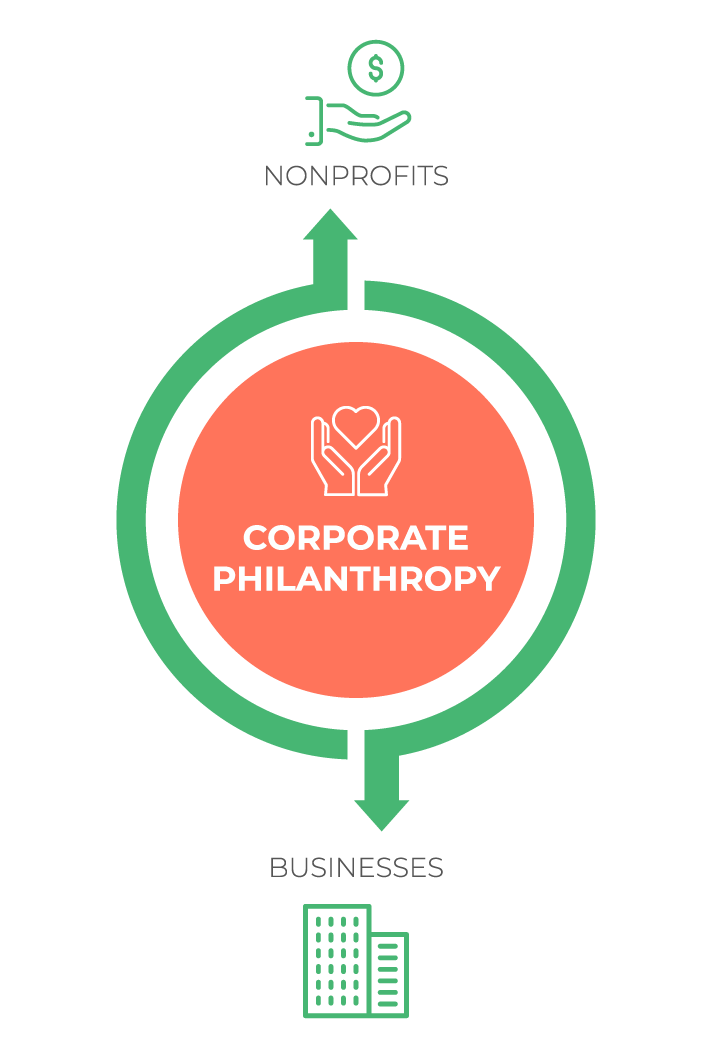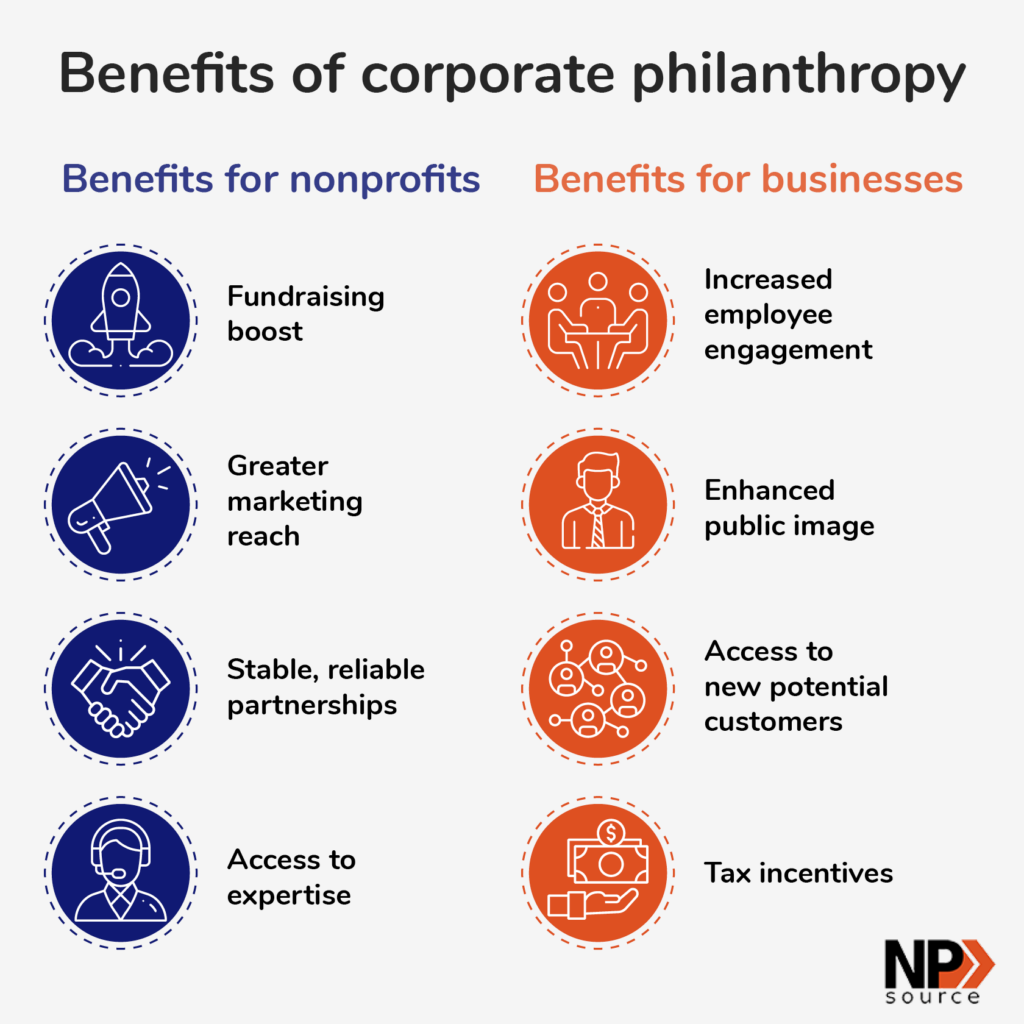Corporate philanthropy as a catalyst for resilient cities
Wiki Article
Checking Out Just How Business Philanthropy Shapes Brand Track Record and Customer Commitment
Business philanthropy considerably affects brand name online reputation and client loyalty. Firms that involve in genuine philanthropic efforts commonly see a favorable shift in just how customers perceive them. This alignment of values promotes depend on and psychological links with audiences. The efficiency of these philanthropic efforts can differ substantially. Recognizing what truly reverberates with consumers is important for brand names seeking to improve their social influence and market placement. What techniques will arise as vital for future success?The Advancement of Business Philanthropy
As companies increasingly recognize their role in culture, the evolution of corporate philanthropy has transformed from mere philanthropic donations to a critical part of brand name identification. Originally, firms engaged in philanthropy largely for tax obligation advantages or to improve their public picture. In time, this approach changed as stakeholders-- including investors, customers, and workers-- required a more authentic commitment to social obligation.Organizations started aligning their philanthropic campaigns with their core values and service purposes, causing even more impactful and thoughtful contributions. This change has encouraged firms to invest in lasting methods and community development, cultivating a sense of function that reverberates with consumers.
Furthermore, technological developments have assisted in openness and involvement, permitting businesses to display their humanitarian efforts extra effectively. As a result, corporate philanthropy has become an integral part of company method, with organizations welcoming the chance to positively influence society while improving their total brand story.
The Effect of Philanthropy on Brand Name Assumption
While business participate in kind initiatives to advertise social good, these efforts greatly form brand name perception among customers. Business philanthropy can improve a brand name's picture by linking it with favorable social impact and area participation. Consumers typically view brand names that actively take part in philanthropic tasks as even more trustworthy and responsible. This perception can influence getting decisions, as consumers may like brand names that show a dedication to social concerns.
Structure Emotional Connections With Providing
Corporate philanthropy acts as a powerful tool for boosting brand identification by linking corporate values with community needs. With strategic providing, companies can cultivate neighborhood involvement and develop shared worths that resonate with consumers on a psychological level. This technique not only reinforces brand name reputation but likewise develops long-term links between businesses and their stakeholders.Enhancing Brand Name Identity
When firms engage in humanitarian initiatives, they not just add to social excellent but additionally build deeper psychological connections with their target markets. By aligning their brand with charitable causes, firms enhance their identification and signal values that reverberate with consumers. This alignment creates a story that exceeds services and products, welcoming consumers to participate in a common goal. As customers progressively focus on purpose-driven brands, companies that actively take part in giving can differentiate themselves in a crowded market. Such campaigns foster a sense of loyalty amongst customers that really feel directly connected to the brand's worths. Ultimately, corporate philanthropy becomes a crucial device for boosting brand name identity, cultivating enduring connections based on shared beliefs and psychological interaction.Fostering Community Interaction
Numerous research studies show that business participating in community-focused philanthropic initiatives can substantially enhance psychological connections with their stakeholders. By purchasing neighborhood projects and sustaining social causes, organizations grow a sense of belonging and count on within the neighborhood. This involvement fosters a favorable brand photo, as clients value firms that demonstrate real worry for societal problems. Furthermore, employees frequently really feel a lot more honored and inspired to be associated with an organization that prioritizes community well-being. As a result, customers are a lot more most likely to develop commitment in the direction of brand names that proactively contribute to significant reasons. Inevitably, promoting neighborhood engagement via philanthropy not just boosts brand reputation but likewise constructs enduring psychological ties that benefit both the area and the business it offers.Developing Shared Values
How can businesses successfully produce shared worths that resonate with their stakeholders? Business can attain this by straightening their humanitarian initiatives with their core objective and the interests of their communities. By involving in efforts that resolve regional demands, organizations promote psychological connections with customers, boosting brand name loyalty. For example, partnering with non-profits that reflect shared values strengthens the brand's photo and demonstrates commitment to social obligation. Furthermore, transparent communication about these initiatives allows stakeholders to see the concrete effect of their payments. Inevitably, by incorporating common worths into their corporate philanthropy, companies not only boost their reputations however likewise grow long lasting partnerships with clients, resulting in enhanced commitment and trust fund. This positioning is necessary in modern consumer decision-making.Case Researches: Successful Philanthropic Campaigns
Examining successful philanthropic projects discloses various techniques that enhance brand name credibility. Impactful area initiatives, cutting-edge partnership models, and long-term engagement strategies have verified reliable in cultivating positive connections with customers. These situation research studies highlight the importance of thoughtful company giving up achieving both social and business purposes.Impactful Community Initiatives
Several companies have effectively leveraged humanitarian campaigns to boost their brand name track record while making a purposeful influence in their areas. A technology firm released an electronic literacy program in underserved communities, supplying training and resources that equipped local citizens. This campaign not only added to community advancement however additionally placed the business as a socially responsible leader. A significant food business executed an appetite alleviation campaign, partnering with neighborhood nonprofits to disperse meals to households in requirement. This effort enhanced area connections and promoted customer commitment. Through these impactful campaigns, business have shown their commitment to social duty, effectively aligning their brand name values with the requirements of the neighborhoods they offer, ultimately boosting their total credibility.Cutting-edge Partnership Models
The success of impactful neighborhood campaigns usually pivots on moved here ingenious collaboration models that unite diverse stakeholders to resolve complex social obstacles. Instance studies highlight exactly how companies, non-profits, and government entities can team up properly. For example, an international corporation partnered with a neighborhood charitable to launch an education program, pooling sources and competence to enhance community literacy prices. An additional example entailed a tech business and a health care company joining pressures to establish a telemedicine remedy for underserved populations. These partnerships not only intensified the reach of philanthropic efforts yet also strengthened the brand names' reputations by aligning their missions with neighborhood requirements. Ultimately, ingenious collaboration designs offer as a stimulant for purposeful change and foster more powerful connections between brand names and their customers.Long-lasting Interaction Methods

Gauging the ROI of Corporate Social Duty
As companies significantly buy corporate social responsibility (CSR) initiatives, comprehending the return on financial investment (ROI) connected with these initiatives becomes vital. Determining ROI in CSR is multifaceted, frequently including both measurable and qualitative metrics. Economic returns can be examined with boosted sales, enhanced brand name commitment, and enhanced staff member morale, which can lead to higher productivity. In addition, firms might examine expense financial savings connected to sustainable methods, such as minimized waste or energy usage.Qualitatively, the influence of CSR on brand name track record can be assessed through consumer assumption research studies and social media belief evaluation. Surveys can supply insights into just how CSR activities influence consumer loyalty and trust. Benchmarking against market requirements can assist organizations gauge their CSR efficiency - corporate philanthropy. Ultimately, look at these guys a complete approach to measuring ROI makes it possible for companies to make enlightened choices concerning future CSR financial investments, straightening methods with both monetary efficiency and social influence
Consumer Assumptions and Corporate Responsibility
Significantly, customers expect firms to operate with a solid feeling of company obligation, watching ethical techniques as a prerequisite for brand commitment. This shift in expectation reflects an expanding understanding of ecological and social issues, leading clients to prefer brands that straighten with their values. Consumers are much more likely to sustain firms that engage in clear practices, demonstrate sustainability, and add favorably to their neighborhoods.Furthermore, social media magnifies these expectations, permitting consumers to share their experiences and point of views rapidly. Brand names that stop working to fulfill these ethical criteria take the chance of reaction, while those that accept business obligation frequently delight in enhanced credibility and customer commitment. As consumers require liability, firms need to integrate business social obligation right into their core techniques, prioritizing ethical behavior not equally as an advertising and marketing technique, yet as a basic element of their procedures. This positioning can ultimately cause stronger brand name fondness and continual success in affordable markets.
Future Trends in Corporate Philanthropy and Brand Name Loyalty
The landscape of corporate philanthropy is developing, affected by the heightened customer expectations surrounding corporate duty. Companies are significantly incorporating social effect into their core business strategies, not merely as a secondary activity. Future fads suggest a shift towards transparency, with brand names sharing in-depth information regarding their kind efforts and their direct results on neighborhoods.Furthermore, technology is playing a crucial role, making it possible for real-time interaction in between customers and brand names. Social media systems assist in direct interaction, permitting customers to articulate their expectations and hold brand names accountable. In addition, younger generations, specifically Millennials and Gen Z, prioritize sustainability and moral techniques, driving services to take on more diligent strategies.
As company philanthropy comes to be associated with brand identification, business that authentically straighten their goals with societal demands are likely to promote stronger consumer loyalty. This merging of values will ultimately form the future of company reputation and consumer relationships in an increasingly diligent marketplace.
Often Asked Questions
Just How Do Consumers Find Out Regarding a Company's Philanthropic Initiatives?
Customers uncover a business's kind efforts with numerous channels, consisting of social media sites, news release, area occasions, and word-of-mouth. These opportunities promote recognition, enabling people to engage with brand names that align with their worths and rate of interests.What Role Does Employee Involvement Play in Business Philanthropy?
Employee participation in corporate philanthropy improves interaction, fosters a feeling of possession, and reinforces group cohesion - corporate philanthropy. This engagement often amplifies the influence of charitable efforts, causing higher her explanation understanding and assistance for the company's kind initiativesCan Corporate Philanthropy Backfire on a Brand name's Credibility?
If regarded as insincere or opportunistic, company philanthropy can undoubtedly backfire on a brand's online reputation. Unfavorable public understanding may emerge, resulting in lessened count on and commitment amongst customers who prioritize authenticity in company actions.Are Smaller Sized Business as Reliable in Philanthropy as Larger Firms?
Smaller firms can be similarly reliable in philanthropy as bigger companies, commonly showing dexterity and credibility. Their local efforts may resonate extra deeply with communities, fostering genuine links regardless of limited sources contrasted to their bigger equivalents.Exactly How Can Business Choose the Right Triggers to Support?
Firms can choose the right bring on by straightening their worths with community needs, assessing stakeholder rate of interests, and assessing possible impact. This strategic technique promotes credibility, improves involvement, and strengthens connections with consumers and the wider neighborhood.While firms engage in philanthropic initiatives to promote social great, these campaigns substantially form brand name assumption among consumers. As consumers increasingly focus on purpose-driven brands, business that proactively engage in offering can distinguish themselves in a crowded market. Lots of business have effectively leveraged humanitarian projects to boost their brand name track record while making a purposeful effect in their areas. Progressively, customers expect companies to run with a strong sense of company responsibility, seeing moral methods as a prerequisite for brand name loyalty. As corporate philanthropy comes to be identified with brand name identification, business that authentically align their missions with societal needs are likely to cultivate stronger consumer loyalty.
Report this wiki page